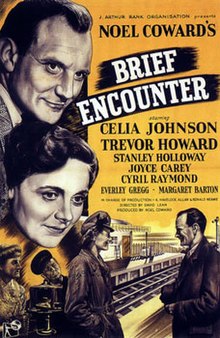Brief Encounter (play)
| Brief Encounter | |
|---|---|

Theatrical release poster
|
|
| Directed by | David Lean |
| Produced by | |
| Written by |
|
| Based on |
Still Life 1936 play by Noël Coward |
| Starring | |
| Music by | Sergei Rachmaninoff |
| Cinematography | Robert Krasker |
| Edited by | Jack Harris |
| Distributed by | Eagle-Lion Distributors |
|
Release date
|
13 November 1945 (Premiere, London) 26 November 1945 (UK) |
|
Running time
|
86 minutes |
| Country | United Kingdom |
| Language | English |
| Budget | $1 million |
13 November 1945 (Premiere, London)
Brief Encounter is a 1945 British romantic drama film directed by David Lean about British suburban life on the eve of World War 2, centring on Laura, a married woman with children, whose conventional life becomes increasingly complicated because of a chance meeting at a railway station with a married stranger, Alec. They fall in love, bringing about unexpected consequences.
The film stars Celia Johnson, Trevor Howard, Stanley Holloway and Joyce Carey. The screenplay is by Noël Coward, based on his 1936 one-act play Still Life. The soundtrack prominently features the Piano Concerto No. 2 by Sergei Rachmaninoff, played by Eileen Joyce.
Brief Encounter was met with wide praise from critics upon its release, and is today considered to be among Lean's finest works. It has been credited as an important early work of realist cinema for its small scale and the lack of big-name stars in its cast. In 1999, the British Film Institute voted Brief Encounter the second greatest British film of all time. In 2017 a poll of 150 actors, directors, writers, producers and critics for Time Out magazine saw it ranked the twelfth best British film ever.
In the latter months of 1938, Laura Jesson, a respectable middle-class British woman in an affectionate but rather dull marriage, tells her story while sitting at home with her husband, imagining that she is confessing her affair to him.
Laura, like many women of her class at the time, goes to a nearby town every Thursday for shopping and to the cinema for a matinée. Returning from one such excursion to Milford, while waiting in the railway station's refreshment room, she is helped by another passenger, who solicitously removes a piece of grit from her eye. The man is Alec Harvey, an idealistic doctor who also works one day a week as a consultant at the local hospital. Both are in their late thirties or early forties, married and with children.
...
Wikipedia
